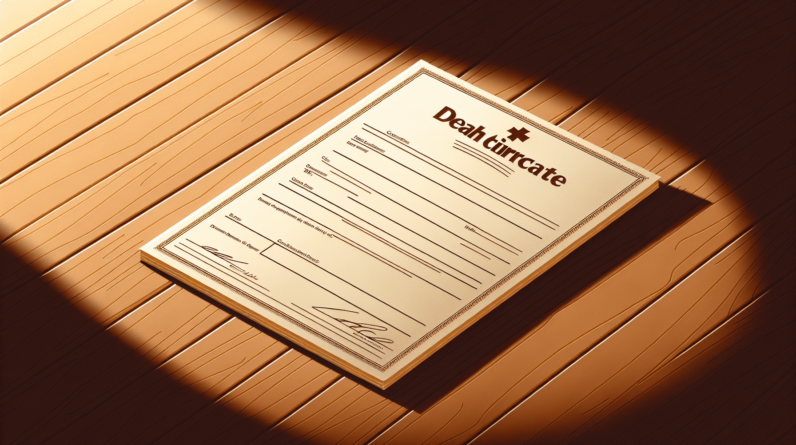
So, you’re wondering what paperwork you’ll need to have the deceased cremated. Well, let me give you some insight. According to my research, there are a few key documents that you’ll need to ensure a smooth process. Firstly, you’ll need the death certificate of the deceased, which can be obtained from the relevant authorities. Additionally, you may need to provide a permit for cremation, depending on the regulations in your area. It’s also important to have any pre-arranged cremation contracts or instructions from the deceased, if applicable. From my experience, it’s always a good idea to contact the crematorium or funeral home beforehand to understand their specific requirements. Our data show that having these necessary paperwork ready can help make the cremation process more straightforward during an already challenging time.
Death Certificate
Obtaining the death certificate is an essential step in the cremation process. The death certificate serves as an official record that confirms the passing of an individual. It includes important details such as the date, time, and cause of death.
To obtain a death certificate, you will need to contact the vital records or registrar’s office in the county where the death occurred. They will provide detailed instructions on how to request a death certificate. Typically, you will need to fill out an application, provide proof of your relationship to the deceased, and pay a nominal fee.
It is advisable to obtain multiple copies of the death certificate as they may be required for various legal and administrative purposes. Having extra copies on hand will save you from potential delays and additional paperwork in the future. It is recommended to get at least ten copies, but you can always request more if needed.
Cremation Authorization Form
Once you have obtained the death certificate, the next step is to contact the crematorium or funeral home where the cremation will take place. They will guide you through the process and provide you with a cremation authorization form. This form is crucial, as it grants permission for the cremation to take place.
The cremation authorization form will require you to provide important information about the deceased, including their personal details such as full name, address, date of birth, and social security number. It is important to ensure that all the information provided is accurate and up-to-date to avoid any complications during the cremation process.
Upon filling out the cremation authorization form, you will need to sign it to indicate your consent for the cremation. Make sure to read the form thoroughly and ask any questions you may have before signing. It is always essential to fully understand and agree to the terms and conditions outlined in the authorization form.
Identification of the Deceased
As part of the cremation process, it is necessary to provide proof of the deceased’s identity. This is done to ensure that the correct individual is being cremated and to prevent any potential mix-ups or mistakes.
A government-issued identification document, such as a driver’s license or passport, is typically required to establish the identity of the deceased. This document should include a clear photograph and be valid at the time of death. If the deceased did not possess a government-issued identification document, alternative forms of identification may be accepted, such as a birth certificate or military ID.
In addition to identification documents, the crematorium or funeral home may also require the social security number or equivalent identification number of the deceased. This information helps in the proper record-keeping and identification verification processes.
Medical Examiner or Coroner’s Authorization
If the deceased passed away under circumstances that require the involvement of a medical examiner or coroner, it is essential to obtain their authorization for cremation. These professionals are responsible for determining the cause and manner of death in certain cases, such as accidents, homicides, or any deaths that occur outside of a healthcare facility.
To obtain the medical examiner or coroner’s authorization, you will need to contact their office directly. They will provide you with the necessary instructions and documentation required. It is important to be prepared to provide the death certificate, any relevant medical records, and other information requested by the medical examiner or coroner.
The authorization from the medical examiner or coroner ensures that all legal and forensic requirements have been met, giving permission for the cremation to proceed.
Next-of-Kin or Executor Authorization
If you are not the next-of-kin or executor of the deceased’s estate, it is crucial to identify and obtain their authorization for cremation. The next-of-kin is usually a spouse, adult child, parent, or sibling of the deceased. The executor is the person designated in the deceased’s will to handle their final affairs.
To obtain the next-of-kin or executor authorization, you should reach out to them personally or via their legal representative. Explain the cremation process and its requirements, and request their permission and cooperation. It is essential to communicate openly and respectfully, understanding that this can be a difficult and emotional time for everyone involved.
In some cases, the next-of-kin or executor may request proof of your authority or power of attorney to act on behalf of the deceased. It is advisable to have relevant documentation readily available to ensure a smooth authorization process.
Pre-Need Cremation Authorization
In certain cases, individuals may have made pre-need arrangements for their own cremation. If the deceased had a pre-need cremation plan in place, it is crucial to review the pre-need cremation authorization documents.
According to my research, pre-need cremation plans typically involve working with a specific funeral home or crematorium. The deceased may have already completed and signed the necessary paperwork, specifying their wishes regarding the cremation process.
Reviewing the pre-need cremation authorization documents will ensure that the information is accurate, up-to-date, and aligns with the deceased’s wishes. If any changes or updates are required, reach out to the applicable funeral home or crematorium to make the necessary adjustments.
Burial Transit Permit
Before the deceased can be transferred to the crematorium, a burial transit permit may be required. This permit is issued by the local county health department and authorizes the transportation of the deceased’s remains.
To obtain the burial transit permit, you will need to contact the local county health department in the jurisdiction where the death occurred. They will provide you with the necessary instructions and requirements for obtaining the permit.
It is important to gather all the required information and provide any necessary documentation to obtain the burial transit permit promptly. Once you have obtained the permit, present it to the crematorium to ensure a smooth transfer of the deceased.
Consent from Family Members
Obtaining consent from all relevant family members before proceeding with the cremation is vital. It is essential to involve all individuals who have a legal or emotional interest in the disposition of the deceased’s remains.
Reach out to family members and have open and honest discussions about the cremation process. According to our data, ensuring that everyone is on the same page and in agreement helps avoid potential disputes or complications later on.
Address any concerns or questions raised by family members, providing them with the necessary information and resources to make informed decisions. Having a compassionate and understanding approach can help alleviate any tensions or conflicts that may arise during this difficult time.
Disposition Authorization Form
To officially authorize the cremation, you will need to complete a disposition authorization form. This form grants permission to the crematorium to proceed with the cremation process.
The disposition authorization form will require you to provide details about the deceased, such as their full name, date of birth, and date of death. Additionally, you may need to provide information about the funeral home or crematorium where the cremation will take place.
Take the time to carefully read and complete the disposition authorization form, ensuring that all the provided information is accurate and up-to-date. Once completed, sign the form to indicate your consent and authorization for the cremation.
Funeral Home Contract
Engaging the services of a funeral home is often a necessary step in the cremation process. Funeral homes can assist with various aspects, including the transport of the deceased, the coordination of memorial services, and the handling of necessary paperwork.
When engaging the services of a funeral home, it is essential to sign a contract outlining the agreed-upon services and associated costs. The contract should cover all details, including the transportation of the deceased, the cremation process, and any additional services or products requested.
Ensure that you thoroughly review the contract before signing, clarifying any concerns or questions with the funeral home representative. It is crucial to have a clear understanding of the services being provided and the financial obligations involved.
By following these steps and completing the necessary paperwork, you can navigate the process of having the deceased cremated with ease and ensure that all legal and administrative requirements are met.






